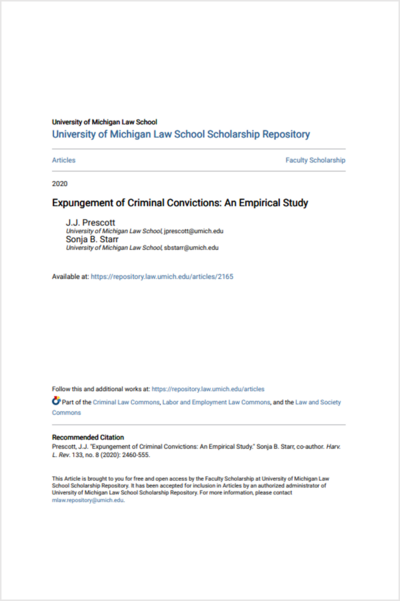Expungement of Criminal Convictions: An Empirical Study
Journal Article
Clean Slate
Topics:
Collateral Consequences
Criminal and Juvenile Records
Employment
Records Clearance, Expungement, and Sealing
Reentry population:
Adults
Date:
Source:
Harvard Law Review
Expungement of Criminal Convictions: An Empirical Study
According to this journal article published in the Harvard Law Review, laws permitting the expungement of criminal convictions are a key component of modern criminal justice reform efforts and have been the subject of a recent upsurge in legislative activity. This debate has been almost entirely devoid of evidence about the laws’ effects, in part because the necessary data (such as sealed records themselves) have been unavailable.
The authors were able to obtain access to de-identified data that overcome that problem, and we use it to carry out a comprehensive statewide study of expungement recipients and comparable nonrecipients in Michigan.
The three key sets of empirical findings are offered.
- First, among those legally eligible for expungement, just 6.5% obtain it within five years of eligibility. Drawing on patterns in our data as well as interviews with expungement lawyers, we point to reasons for this serious “uptake gap.”
- Second, those who do obtain expungement have extremely low subsequent crime rates, comparing favorably to the general population — a finding that defuses a common public-safety objection to expungement laws.
- Third, those who obtain expungement experience a sharp upturn in their wage and employment trajectories; on average, within one year, wages go up by over 22% versus the pre-expungement trajectory, an effect mostly driven by unemployed people finding jobs and minimally employed people finding steadier or higher-paying work.




